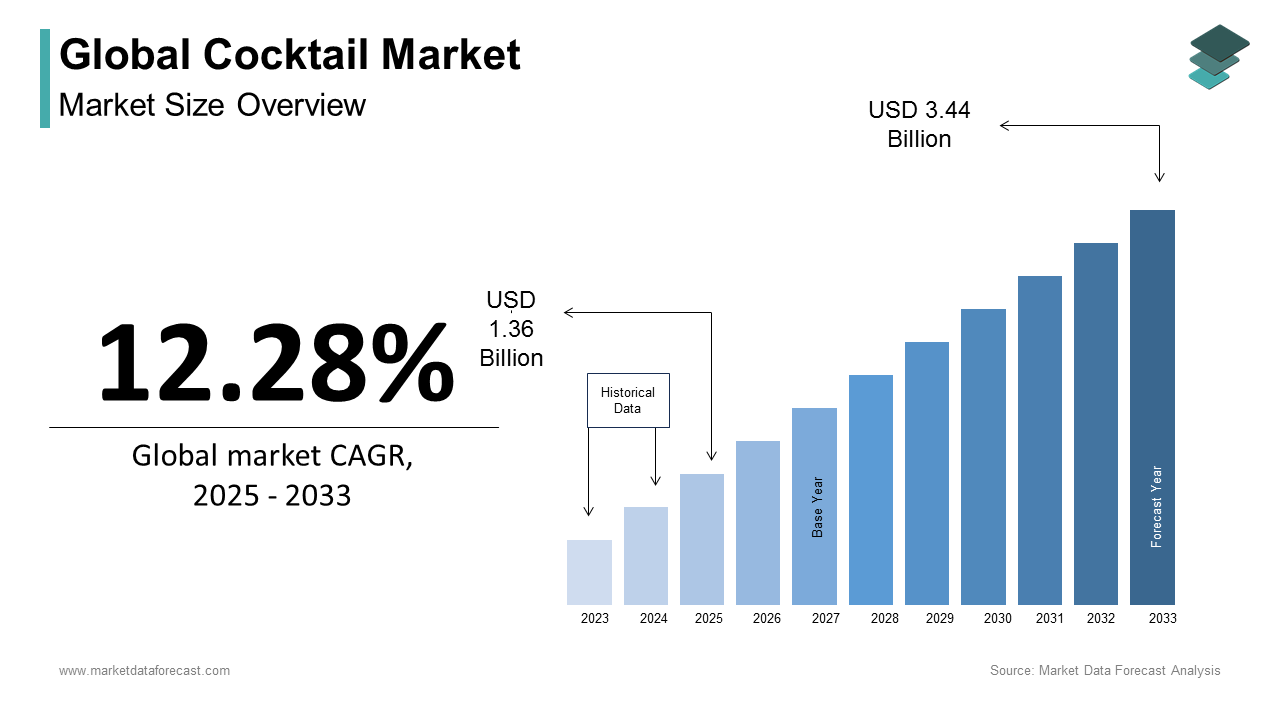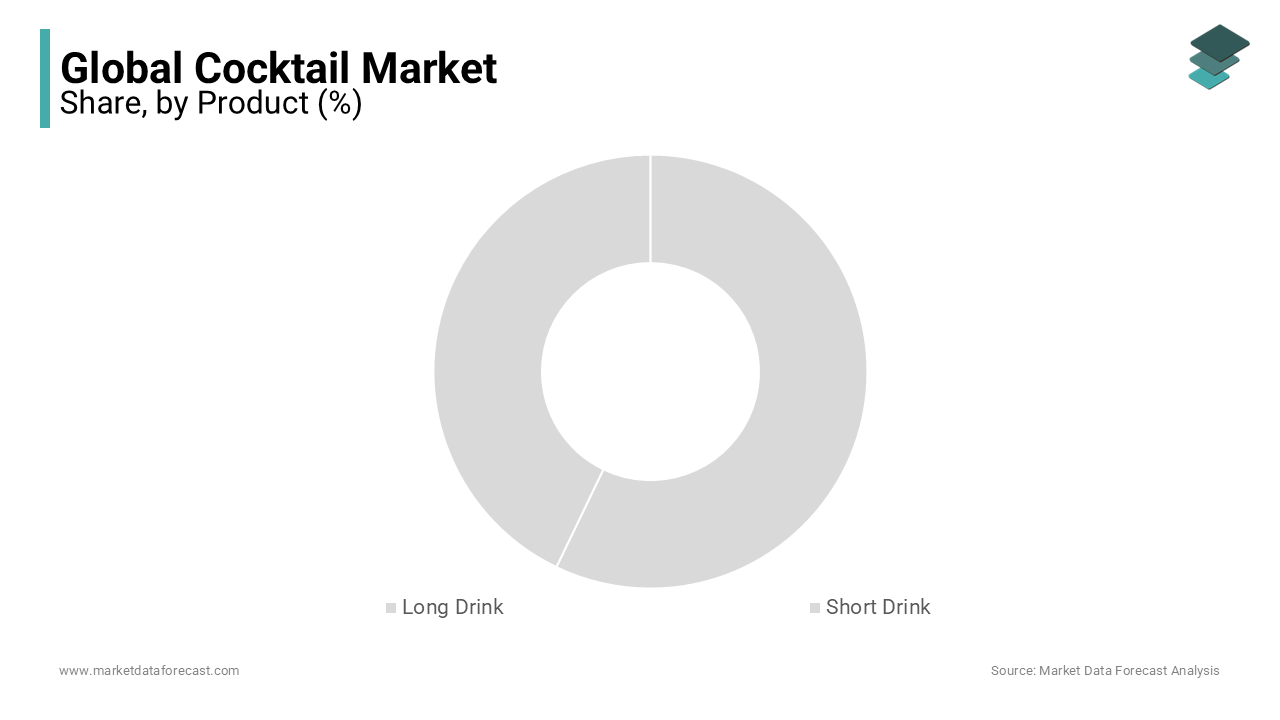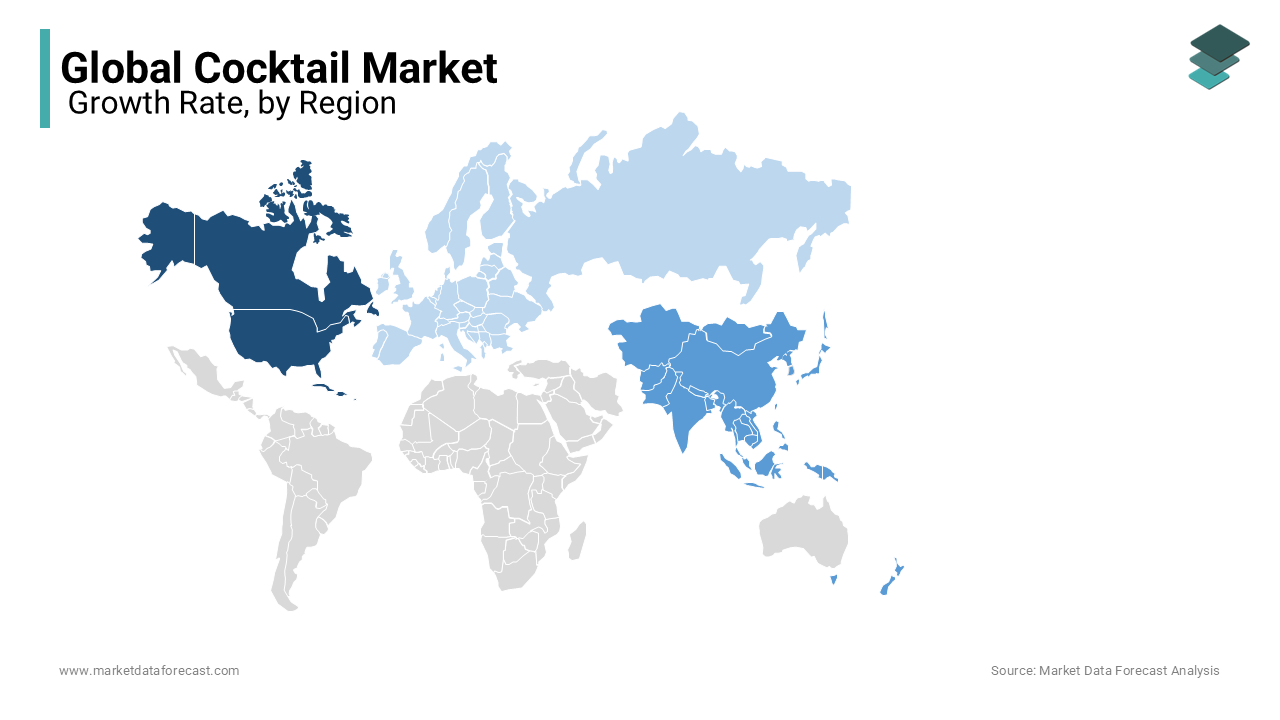Global Cocktail Market Size, Share, Trends & Growth Forecast Report Segmented By Type (Short Drink and Long Drink), Application (Wedding Ceremonies, Backyard BBQ, Cocktail Party and Others), Distribution Channel (Supermarkets and Hypermarkets, Convenience Stores, Bars and Restaurants & Online Retail) and Region (North America, Europe, Asia Pacific, Latin America, And Middle East & Africa), Industry Analysis (2025 To 2033)
Global Cocktail Market Size
The global cocktail market size was worth USD 1.21 billion in 2024 and is estimated to reach USD 3.44 billion by 2033 from USD 1.36 billion in 2025, growing at a CAGR of 12.28% from 2025 to 2033.

Cocktail refers to an alcoholic beverage that comprises of gin, brandy, vodka, whiskey, tequila, or rum that is combined products like fruit crush, cream, honey, milk, sugar, herbs, or other flavorings.
The cocktail market has seen a steady increase among consumers in recent years because the product can be seen as a form of alcohol consumption. Cocktails increased due to the increase in drinking beverages. Since then, the cocktail market has seen many innovations and varieties of products to meet the needs of consumers. The increase in cocktail consumption is due to a rise in income and alter in lifestyle drives the expansion of the market. Besides, the availability of vegetable & botanical cocktails is likely to act as a catalyst in the growth of the global cocktail market.
The mixology community significantly influences the sale of alcoholic beverages and plays a vital role in emphasizing new spirit categories emerging craft distillers. Additionally, creative cocktails are essential in boosting demand for established drink categories. In recent years, botanical or vegetative spirits have had a significant influence, as vegetal ingredients provide vibrant, herbal notes to cocktails without overpowering their overall taste. These components enable bartenders to incorporate intricate, mildly bitter flavors, offering guests a nuanced and refreshing experience.
Sound is another trend witnessed only in some bars in 2024 but is expected to have a more notable impact in this market. Drinks and music are barely a newly established match, however, in 2024 it was observed a small number of bars have raised the level by adopting the Japanese ‘kissa’ concept. These locations are listening cafes or bars, where visitors come primarily to enjoy music, placing drinks in a supporting role. Among the new openings this year is Black Lacquer (featured) in London, which aspires to give equal prominence to both the music and the drinks.
MARKET DRIVERS
Rising demand for cocktails drinks can be credited to the improving lifestyle of people, increasing per capita incomes in developing countries. Also, holiday seasons provide an even more boosted demand for cocktails, further contributing to the growth of the market. The cocktail market has increased significantly in the last decade, but the growth of the cocktail industry has been very slow in the last five years. Also, the introduction of new products such as frozen cocktails and canned cocktails has made it easier for people to enjoy them at home and has also made them cheaper and more available to consumers of all classes. The global cocktail market has been growing immensely due to many factors, such as the increasing per capita income in developing countries and the easy availability of botanical and vegetable cocktails. Cocktails refer to drinks that involve the mixing of two beverages, one of them being alcohol based. The cocktail market is largely driven by the weather and seasonal holidays of consumers, such as those who enjoy picnics and parties. The global cocktail market has seen significant gains over the past decade, but market growth has been very slow for the past five years. The main driving force of the cocktail is the pleasant and convenient use that can be used directly without the effort of mixing the ingredients of the cocktail. This product also offers the benefits of being used while traveling. The cocktail market has opportunities to expand in hot regions like the dry tropics, and by building more distribution channels, sales can increase. The global cocktail market has stagnated due to limited product innovation. This product is less popular with people over 40 and the younger generation is a major contributor to the growth of the cocktail market.
The increase in alcohol consumption around the world and the willingness of consumers to try innovative products are also expected to drive the growth of the global cocktail market. The cocktail culture initially began in North America, and soon after, European countries and the Asia Pacific region caught up with the culture. The cocktail market is fueled by consumer climate and seasonal vacations like picnics and parties. This product also offers the benefits of using it while traveling. The main driving force behind the cocktail is its pleasant and convenient use, so you can use the cocktail ingredients directly without mixing them. The cocktail market is stagnant, with limited product innovation. This product is unpopular with people over 40, and the younger generation is one of the main contributors to the growth of the cocktail market. The global cocktail market has opportunities to expand in areas with high temperatures, such as arid and tropical areas, and more distribution channels can be built to increase sales. Consumption of alcohol is increasing worldwide, and consumers' readiness to use innovative products is expected to fuel the growth of the worldwide cocktail market.
MARKET RESTRAINTS
Despite the growing demand for cocktails, Alcohol is medically proven to be harmful to health, causing depression, alcoholism, liver problems, etc. With improvement in people's lifestyles also comes people becoming more self-aware about their health and giving up alcohol. Additionally, cocktails usually come with a high amount of sugar, further pushing away the health conscious. Moreover, the demand for cocktails is usually limited to the youth and is very low for consumers over the age of forty. Thus, even though the market is growing, the growth rate hasn’t grown much through the years.
MARKET OPPORTUNITIES
Multiple proclivities are expected to provide potential opportunities for the expansion of the cocktail market. Sustainability has evolved beyond a mere buzzword; it is a movement that redefines the market’s scene. In the coming years, we look forward to a significant increase in this drink made with locally sourced and eco-friendly ingredients. Distilleries are focusing on sustainable practices, ranging from farm-to-bottle production to minimizing carbon emissions. Expect cocktails that highlight seasonal fruits, foraged botanicals, and organic herbs that honor local terroir while supporting eco-conscious producers.
Plant-based mixology is another aspect that is believed to influence the market growth rate in the future. With the surge in plant-derived diets, cocktails are also adapting to this trend. Mixologists in this market are ingeniously incorporating plant-sourced elements into their drinks, utilizing ingredients such as Aquafada (the liquid from chickpeas) for emulsions and foams. Anticipate cocktails enriched with earthy flavors like mushroom bitters or activated charcoal, providing a unique reinterpretation of classic recipes. This trend not only deepens the flavor profiles of this drink but also attracts health-conscious consumers in search of guilt-free indulgence. Therefore, both are projected to take the market to a new level and are part of several factors.
MARKET CHALLENGES
Competition and saturation are two of the major problems impeding the growth of the cocktail market. It is becoming increasingly crowded, with numerous bars, restaurants, and craft distilleries entering the scene. This saturation makes it difficult for individual establishments to stand out and attract customers. Altering consumer preferences is also an aspect derailing the market growth trajectory. Customers are turning to more health-aware and are progressively seeking low-alcohol or non-alcoholic options. This change requires market players to adapt their menus and offer innovative substitutes for traditional cocktails. Additionally, there is growing pressure from people to adopt sustainable practices in sourcing packaging and ingredients. Brands and companies must identify ways or solutions to balance sustainability with cost-effectiveness.
REPORT COVERAGE
|
REPORT METRIC |
DETAILS |
|
Market Size Available |
2024 to 2033 |
|
Base Year |
2024 |
|
Forecast Period |
2025 to 2033 |
|
CAGR |
12.28% |
|
Segments Covered |
By Type, Application, Distribution Channel, and Region |
|
Various Analyses Covered |
Global, Regional & Country Level Analysis; Segment-Level Analysis; DROC, PESTLE Analysis; Porter’s Five Forces Analysis; Competitive Landscape; Analyst Overview of Investment Opportunities |
|
Regions Covered |
North America, Europe, APAC, Latin America, Middle East & Africa |
|
Market Leaders Profiled |
Captain Morgan, Bols, Snobar Cocktails, Cointreau, Kold Cocktails, Manchester Drinks Co. Ltd, Bodega Co. de Siam Ltd, Rio Wine, Cocktail Natives, Miami Cocktail Co, Harvest Hill Beverage Company, Arbor Mist Winery, Snake Oil Cocktail Company, N1CE Company Ltd, Four Blue Palms, Inc, Belvedere, Bombay Sapphire, The Absolut Company and Others |
SEGMENTAL ANALYSIS
By Product Type Insights

The long drink segment is leading with the highest share of the market, with the rising awareness among those who do not drink highly concentrated alcoholic beverages. In fact, in most countries, long drinks are served as refreshing cold drinks mixed with a low amount of alcohol and other ingredients like grapefruit, according to the preference of the consumers. The long drinks are made up of any two ingredients. When that is mixed with another third ingredient, it will be known as a cocktail. The prominence of low-concentrated drinks is trending for today’s generation, which is likely to enhance the growth rate of this market.
The short drink segment is gearing up to hit the highest CAGR by the end of 2032. These drinks usually have high concentrations of strong alcohol and a small amount of non-alcoholic substances. This progress can be attributed to the cultural shifts in socializing. It has changed over time, with people now favouring shorter gatherings and quick meet-ups. Short drinks are perfect for this new vibe, letting guests sip a refreshing cocktail while chatting without the need for a full meal or a long night out.
By Application Insights
The cocktail party segment is attributed to leading with the dominant share of the market. In recent times, the number of cocktail consumers has risen in both developed and emerging countries. The trend for weekend parties with cocktails and get-togethers is subsequently to fuel the growth rate of the market. The preference for cocktails, even in wedding ceremonies, is becoming more common, which is augmented in elevating the growth rate of this segment. Hosting flavored and customized cocktails according to the guest’s preference is attributed to enhancing the symbolism of the wedding ceremony. This is greatly influencing the growth rate of the market. The cocktail party in wedding ceremonies is very common in Western countries, and that is slowly being adopted in various countries as well with the penetration of different social media platforms. Social media influencers spread the distinct wedding style, and people are adopting the modern style of ceremony in emerging countries like India and China.
By Distribution Channel Insights
The bar and restaurant segment is leading with the largest share of the market, whereas the online retail segment is attributed to have the highest CAGR by the end of 2032. People are more likely to have drinks and party hard at bars and restaurants on weekends or other occasions. Customization of different flavoured drinks completely according to the consumer’s interest shall leverage the growth rate of the market to the extent. In addition, the market size of this segment expanded because these establishments are generally quick to implement the emerging trends in this field worldwide, like the use of local ingredients, sustainable practices, or innovative mixing techniques. This adaptability keeps their offerings fresh and relevant, attracting consumers eager to try the latest trends.
In today’s world, the prominence of purchasing various goods through online retail is becoming so common that a number of people depend on food delivery applications. The strict instructions from the government to not drink and drive in most countries are eventually changing the minds of people to drink by ordering through online food delivery applications. The segment’s market share is increasing due to accessibility and convenience. People today like convenience, and online shopping makes it simple to buy cocktails and offerings related to this drink without having to step into a store. This ease of access lets customers explore a variety of choices and shop whenever it suits them.
REGIONAL ANALYSIS

North America is the largest producer and consumer of cocktails, followed by Europe, where the demand is growing due to the association of cocktails with the booming food and fine dining industry. The fastest-growing region right now is the Asia Pacific which consists mainly of developing countries. In other regions of the Asia Pacific, the global cocktail market is in its infancy, consumer awareness is very low, and only the upper-class population is expected to contribute to a relatively small market. The improving lifestyle of people in developing countries is leading to the growth of the cocktail market in this region.
The European cocktail market is very popular and is a popular product in the UK. Germany and the Netherlands are also areas where the cocktail market is growing. The cocktail market can see growth in Latin America due to its high consumer awareness and product awareness and its proximity to North America. North America closely follows Europe with consumer awareness and trends favouring the growth of the cocktail market.
KEY MARKET PARTICIPANTS
Major Key Players in the global cocktail market are Captain Morgan, Bols, Snobar Cocktails, Cointreau, Kold Cocktails, Manchester Drinks Co. Ltd, Bodega Co. de Siam Ltd, Rio Wine, Cocktail Natives, Miami Cocktail Co, Harvest Hill Beverage Company, Arbor Mist Winery, Snake Oil Cocktail Company, N1CE Company Ltd, Four Blue Palms, Inc, Belvedere, Bombay Sapphire, The Absolut Company and Others.
RECENT HAPPENINGS IN THE MARKET
- In October 2023, the iconic entertainment, cocktail, and sunset location named Rock Bar introduced a unique, sustainable menu of cocktails crafted by the recently designated head on its 15th anniversary.
MARKET SEGMENTATION
This research report on the global cocktail market has been segmented and sub-segmented based on type, application, distribution channel and region.
By Product Type
- Long Drink
- Short Drink
By Application
- Backyard BBQ
- Wedding Ceremonies
- Cocktail Party
- Others
By Distribution
- Bars and Restaurants
- Supermarkets and Hypermarkets
- Convenience Stores
- Online Retail
By Region
- North America
- Europe
- The Asia Pacific
- Latin America
- The Middle East and Africa
Frequently Asked Questions
1. What factors are driving the growth of the cocktail market?
Several factors contribute to market growth are Increased spending on leisure and entertainment, Growing popularity of cocktail bars and mixology, Development of new flavors, ingredients, and ready-to-drink (RTD) cocktails, and Demand for low-alcohol and non-alcoholic options.
2. What are the key challenges in the cocktail market?
The key challenges in the cocktail market are Varying alcohol regulations and legal drinking ages, Rising awareness about alcohol consumption and its health impacts, High competition among brands and bars, and Availability and cost of quality ingredients.
3. What are the future trends in the cocktail market?
The future trends in the cocktail market are Ready-to-Drink (RTD) Cocktails are Increasing popularity of pre-mixed, convenient cocktail options, Use of eco-friendly packaging and sustainably sourced ingredients, Rise of artisanal and small-batch cocktails with unique flavors, and Growth in low-calorie, low-sugar, and non-alcoholic cocktails.
Related Reports
Access the study in MULTIPLE FORMATS
Purchase options starting from
$ 2500
Didn’t find what you’re looking for?
TALK TO OUR ANALYST TEAM
Need something within your budget?
NO WORRIES! WE GOT YOU COVERED!
Call us on: +1 888 702 9696 (U.S Toll Free)
Write to us: sales@marketdataforecast.com